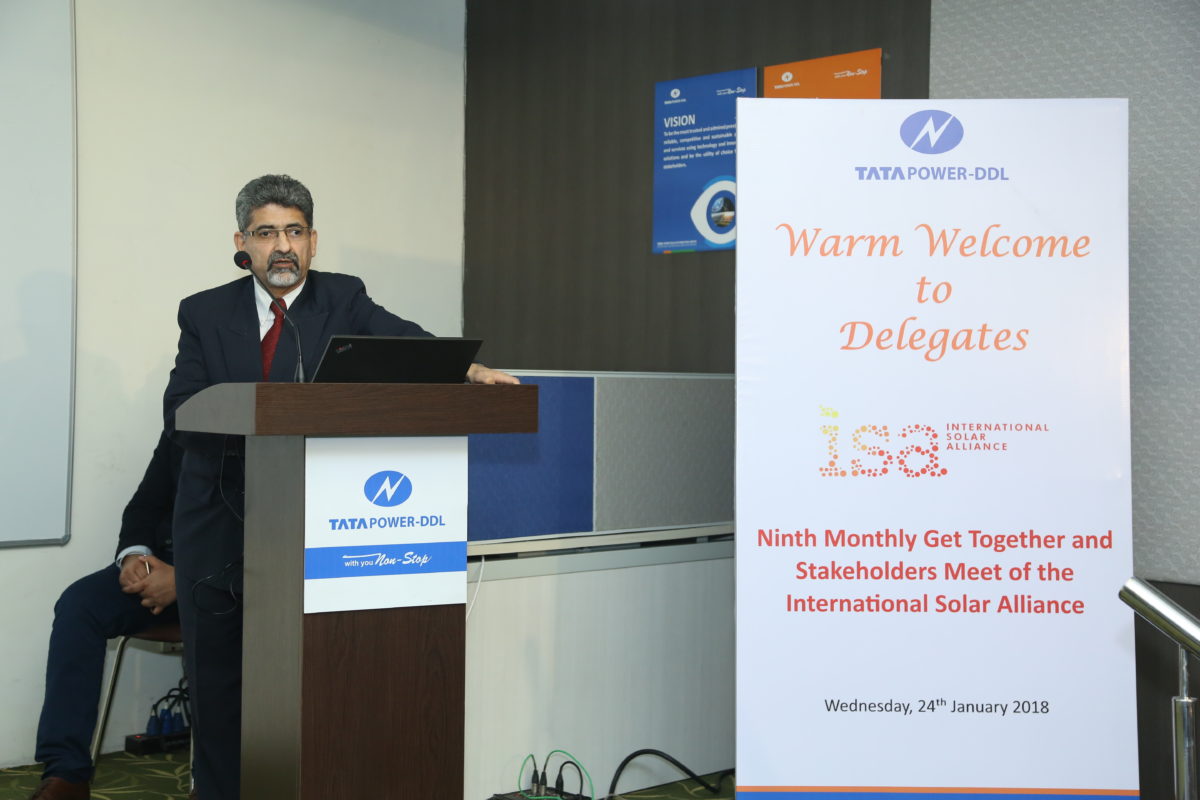Know predominantly as a thermal power generation company, the National Thermal Power Corporation (NTPC) Ltd is ramping up its promotion of renewables, especially solar, in its energy mix. However, renewables account for roughly 2% of its total energy portfolio of 51.4 GW. According to NTPC data and recent installations, NTPC’s solar portfolio is estimated to be around 1 GW.
The corporation has pledged to improve this scenario and has therefore set a renewables target of 32 GW by 2032, said Surinder Raina, Executive Director, NTPC, at the 9th stakeholder meet of the International Solar Alliance (ISA) held in New Delhi on January 24.
pv magazine attended this gathering virtually, via a live broadcast, and this is what we discovered.
Earlier in 2015 the NTPC had proposed to government that it will set up 10 GW of renewable projects by 2022, working with EPCs and developers.
Domestic solar cells and modules – EPC model
Raina mentioned that the NTPC had grown its PV portfolio from 5 MW to 870 MW solar capacity, between 2013 to May 2017.
Raina highlighted the various solar parks project implemented by NTPC, where only domestic-manufactured cells and modules were used. The 250 MW Anantapuramu Ultra Mega Solar Park in Andhra Pradesh was commissioned in the space of a year from April 2015 to April 2016. The contract was awarded to four agencies: Tata (100 MW), Lanco Infratech (50 MW), BHEL – Bharat Heavy Electricals Ltd (50 MW), and Sterling & Wilson (50 MW).
The 260 MW Bhadla solar park project in Rajasthan was also commissioned in one year. The EPC agencies were Vikram Solar (2 x 65 MW), Jakson solar (65 MW), and Tata (65 MW).
The 250 MW Mandsaur solar project, located in Neemuch Agar Solar Park in Madhya Pradesh state was developed by EPC agencies Lanco Infratech (2 x 50 MW), Vikram Solar (50 MW), BHEL (50 MW) and Tata (50 MW). In all of these projects, domestically manufactured cells and modules were used.
Moreover, 478 MW of PV projects are under tendering.
Future solar PV projects
Raina revealed details about NTPC’s future projects. In Nokh, Rajasthan (980 MW) – a solar park has been sanctioned by the MNRE, and a Detailed Project Report (DPR) is under finalization. The Rajasthan Renewable Energy Corporation Ltd (RRECL) has offered the land to NTPC.
Another project is Harshad in Gujarat (350 MW) – here, Gujarat Power Corporation Ltd (GPCL) has offered this site to NTPC for development. A DPR for the solar park is under finalization by GPCL, and Gujarat’s government will buy the power.
Battery Energy Storage Systems (BESS)
NTPC has also signed MoUs with Andaman and Nicobar (A&N) state government for 50 MW solar projects. A&N is an island located in the Bay of Bengal. Two BESS projects, 8 MW in Chidiya Tapu and 17 MW in Manglutan, have been already tendered, however, it was reported earlier that the tenders were cancelled. That stated 25 MW cumulative capacity, however, is in actual fact lower: both locations will install storage capacity of 9.2 MW each.
NTPC has a 2 MWh BESS project functioning in the Andaman Islands already.
Floating solar
Raina revealed that in a recent review by the Ministry of Power, NTPC is asked to install a 25 MW floating solar project plus battery storage system at two locations.
NTPC had installed its 100kW floating solar plant at Rajiv Gandhi Combined Cycle Power Plant (RGCCPP) in Kayamkulam, Kerala.
Solar projects – Developer model
Raina also revealed details concerning the NTPC’s solar projects under the developer model, as part of the National Solar Mission Phase II, Batch II – with a total capacity of 15 GW. In Batch II Tranche I, 2.65 GW out of a proposed 3 GW have been already commissioned. For Tranche II (5 GW) and Tranche III (7 GW), the MNRE has yet to issue the guidelines.
Other developer model projects mentioned by Raina were a 250 MW plant for NDMC (New Delhi Municipal Corporation), and a 750 MW solar project at Anantpuramu, Andhra Pradesh.
Raina also mentioned the critical issues that the solar industry is facing. Falling solar tariffs, different government schemes resulting in differential tariffs, uncertainty caused by Safeguard and Anti-Dumping Duty, difficulties in signing PPA with DISCOMs, availability of land for solar parks, and scarcity of water supply for cleaning were raised as the most pertinent topics.
This content is protected by copyright and may not be reused. If you want to cooperate with us and would like to reuse some of our content, please contact: editors@pv-magazine.com.








By submitting this form you agree to pv magazine using your data for the purposes of publishing your comment.
Your personal data will only be disclosed or otherwise transmitted to third parties for the purposes of spam filtering or if this is necessary for technical maintenance of the website. Any other transfer to third parties will not take place unless this is justified on the basis of applicable data protection regulations or if pv magazine is legally obliged to do so.
You may revoke this consent at any time with effect for the future, in which case your personal data will be deleted immediately. Otherwise, your data will be deleted if pv magazine has processed your request or the purpose of data storage is fulfilled.
Further information on data privacy can be found in our Data Protection Policy.